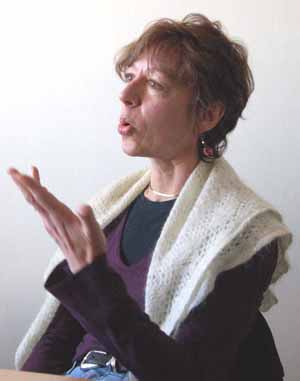|
|
||
| Spring 2006 | ||
|
It's Spring (well, almost Summertime), and another CDC newsletter is born. Out of days of drenching rain and emerging from the mounting rubble of our unsustainable ways, we are forging ahead to help grow democracy in local communities. So . . . Welcome to Rights!, the newsletter of the Center for Democracy and the Constitution ("CDC"), published as monthly as we can make it! We're working to end the constitutional rights of corporations and to create a vital, living democracy in the U.S.A. (including strong businesses run for the public good), starting at home in New England. Adam D. Sacks, Editor |
In this issue:
|
|
|
The Founding Fathers: Just What Did They Originally Intend, Anyway? |
||
 Fifty-five privileged white men met in secret conclave in Philadelphia
in the spring of 1787 with a mandate to amend the Articles of Confederation, the
governing document of the new nation. The Articles had outlined an agreement
of cooperation among independent states - the sense of the time was that
central government, which was viewed with suspicion, should be minimal.
But this was a most inconvenient state of affairs for
those who were given to consolidate economic and political power for themselves.
And the last thing they wanted was democracy.
Fifty-five privileged white men met in secret conclave in Philadelphia
in the spring of 1787 with a mandate to amend the Articles of Confederation, the
governing document of the new nation. The Articles had outlined an agreement
of cooperation among independent states - the sense of the time was that
central government, which was viewed with suspicion, should be minimal.
But this was a most inconvenient state of affairs for
those who were given to consolidate economic and political power for themselves.
And the last thing they wanted was democracy.
Instead, they crafted a new document, brilliantly designed to advance the interests of their class, the governing class. They felt pressured unto panic by what James Madison referred to as "the rapid growth of anarchy" (he was referring to uprisings such as Shays' Rebellion, which demanded people's rights). Here are a couple of quotes from Madison's Notes of Debates in the Federal Convention of 1787: "The general object [of the Senate, which was to be elected by state legislatures, not by voters] was to provide a cure for evils under which the U.S. laboured; that in tracing these evils to their origin every man had found it in the turbulence and follies of democracy . . ." Edmund Randolph, VirginiaThere was also an occasional defense of democracy, usually qualified by an apology: "[The House of Representatives is] to be the grand depository of the democratic principle of the Government . . . [admitting] that we had been too democratic but . . . afraid we should incautiously run into the opposite extreme." George Mason, VirginiaNote that Mason did not sign the Constitution, and became a vocal anti-Federalist. So what did founding fathers intend? They intended many things, which they discussed and disputed in detail, and to a certain extent an observer can pick and choose according to personal preference. But there was no Bill of Rights in the original Constitution, it was a document further legalizing slavery, and the overall thrust is clear to anyone who cares to read their words unrestrained by the bonds of American mythology. We live with and struggle desperately under that legacy today. What the founding fathers feared most was a government of, by and for the people, and despite noble words they went to great lengths to prevent it. (We discuss the founding fathers and their constitution, among many other pertinent topics, in Democracy School.) |
||
| Democracy School | ||
|
Next Democracy School in Boston:
October 20-22, 2006 "The course was a great awakening for me and provided me with tools to use in my community to help make our government work for our interests." Diane Battistello, attendee at the May Boston Democracy School  Smilia Marvosh, an experienced activist from Swampscott and
one of CDC's Board Members, is speaking to the attendees at the January Boston
Democracy School, explaining her 12-step recovery from regulatory addiction.
Smilia Marvosh, an experienced activist from Swampscott and
one of CDC's Board Members, is speaking to the attendees at the January Boston
Democracy School, explaining her 12-step recovery from regulatory addiction.
There are more and more Democracy Schools scheduled around the country as communities recognize that there is no safety from corporate assault when the only institutions we turn to - courts, legislatures, regulatory agencies - are the source of the problem in the first place: the absence of democracy, the absence of authority to decide what happens in our communities, the absence of our fundamental and inalienable rights. We cover the history and development of corporations in the U.S., the movements for people's rights, exciting current developments in fighting illegitimate corporate "rights" in Pennsylvania, and strategizing on how to apply all of these lessons for the benefit of communities in the Northeast dealing with toxics, sprawl, pollution, noise, and corruption of government. Democracy School is highly recommended to anyone interested in changing our collision course with corporate rule! To find out more about our Boston Democracy School, click here. Enrollment is limited, advance registration highly recommended. For our national schedule, click here. |
||
|
A Tale of Two Dilemmas: Democracy and the Medicine Tube |
||

|
||
|
This tube of medicine seems to have much in common with our would-be democracy: we can't
use it for the people until we puncture it to get in. But once we've punctured
it and we're in it's important not to use it!
Well, we know what the pharmaceutical manufacturer meant to say . . . it only had our own best interests at heart, lest we use a tainted tube (and perhaps sue, of course). But in spite of itself here's a corporation expressing the paradox of the rapacious growth on which it thrives: while we crash down that path, if truth be told we'd better not crash down that path. Because its products and process are so fraught with peril it has the inadvertent courtesy to tell us not to buy the bill of goods it's selling us. I understand that I may be reading just a wee bit more into this tube than was intended, but nonetheless it's one of the more insightful corporate statements I've seen in a while . . . |
||
| Community Legal Services | ||
|
Thanks to Board Member and Attorney Neil Berman, CDC now offers low-cost legal
services ($65/hour) to communities
committed to rights-based organizing. If your community is confronting a
corporate assault, is frustrated by the regulatory system, wants to work
towards addressing the root causes of our failure to control corporations --
and it wants to have another chance to protect its residents and resources
in the process, call the CDC office at (781) 674-2339.
|
||
| Short Takes | ||
|
Biomass Will Ruin Russell!
In our last newsletter (Fall 2005, you can view it here) we told you about the struggle in the bucolic Western Massachusetts town of Russell against a biomass incinerator/power plant. Biomass is a thinly disguised greenwash intended for burning toxic construction and demolition waste. But because it is touted as renewable energy it has the support of the state and federal governments. That it would ruin local communities with pollution, truck traffic and deforestation is of little concern to our industry-friendly politicos. 
For if they truly had the interests of their constituents at heart they would be fighting relentlessly for non-polluting and non-destructive energy sources and supporting local sustainable economies rather than distant corporations that suck the environmental and socio-economic life out of our cities and towns. The folks in Russell aren't taking this life-snatching invasion sitting down. In early May, after a bitterly contested election, their Democracy Team took over the Town Planning Board by a 4-1 margin. Their selectman candidate lost by only 5 votes out of 529 (a recount is scheduled) in an election that drew 60% of the voters to the polls, an unheard-of number for an off-season municipal election in Massachusetts. Citizens of Russell are as determined as ever to preserve their environment and quality of life. Another Democracy School is scheduled, and they are deeply committed to the constant vigilance and activism required of a sovereign people. Visit the Concerned Citizens of Russell website, or come to a regular Monday night meeting. Another group, Direct Democracy, is crafting new laws to support the townspeople's fundamental rights.  School for Corporations?
School for Corporations?
Even if trucks and buses can't go to school, maybe corporations can. Hey, a little education might help, you never know. Well, actually we do know - it's impossible to educate a fictional entity, that lives forever with limited liability, having no body, no morals, no soul and no intelligence except for endless acquisition at any cost. Let alone expect it to be "responsible." But the photo was too entertaining to pass up . . . |
||
| Undoing the Dominator Culture | ||
|
by Mary Zepernick, Board Member of the Center for Democracy and the
Constitution, and Coordinator for the Program On Corporations, Law
and Democracy (POCLAD)
We who aspire to creating a democracy movement in the United States must take to heart the following admonition by poet Adrienne Rich: "Until we can understand the assumptions in which we are drenched, we cannot know ourselves." And without knowing ourselves -- historically, collectively and individually -- we can hardly succeed at the enormous challenge of creating and sustaining genuine self-governance. So what are some of the assumptions in which our culture is drenched? For starters, that ours is a democratic nation! And how about majority rule is democratic; growth and progress are good; private property is sacred; freedom is tied to choice of products. Supply your own. Perhaps the most damaging to our democratic aspirations is the persistent -- if often unspoken and even unconscious -- assumption that we humans are not really capable of self-governance. Not surprising, given the mythology perpetuating the ruling class, whoever they have been or are today. As Cornel West put it, "Our minds are so colonized that we can scarcely imagine what a real democracy would look like." Underlying these assumptions, including the one that doubts our capabilities, is the patriarchal or dominator worldview or paradigm. For the past nine or ten millennia, most societies have assigned dominant or subordinate status to basic human differences or characteristics, and exercised power (defined as over others) and distributed resources accordingly. No wonder "power" has such a bad name and people so often blame "human nature" for our flaws and failures. Ten thousand years is a lot of history to carry on our backs, all the more as this burden is seldom identified, much less examined. |
||

|
||
|
Patriarchy isn't an exclusively gendered word, but a deeply rooted cause
of the fix we're in today in terms of the definition and use of power.
Some aspects of our U.S. patriarchal/dominator culture are: the few ruling
the many, using the Constitution, the rule of law, and for the past century
and a half, the giant corporation; warmaking and other forms of violence;
racism, sexism, heterosexism/homophobia and other discrimination/oppressions;
economic injustice; and the despoiling of our planetary nest.
What is the alternative? Whether one calls it democracy, self-governance, or a partnership society (which writer Riane Eisler contrasts with a dominator society), there are attitudes, behaviors and skills -- some call these the "democratic arts" -- necessary for self-governance. For example, equality -- the valuing and inclusion of everyone -- is a prerequisite for any arrangement worthy of the name democracy. In the United States alone the history of oppression and discrimination, to say nothing of the divide-and-conquer tactics that have served the patriarchs so well, is a critical challenge to those of us who would build an egalitarian movement. This effort must include a commitment to identify and root our own patriarchal / dominator thinking and behavior. Some progress notwithstanding, I can report that it's a lifelong struggle! | ||
| Join Us! | ||
|
As you can see, we have a lot of work to do, and we need you! Come to a Democracy School.
Organize in your community. Contribute to the work of the Center for Democracy and the Constitution.
To further this challenging work, we have to meet our modest expenses. Your contribution will make a big difference! To contribute online, click here. Or make out a check to "CDC" and mail it to: Center for Democracy and the Constitution 12 Locust Avenue Lexington, MA 02421 Contributions are tax deductible. Many thanks for your interest and support! Adam D. Sacks Executive Director (781) 674-2339 www.constitution411.org |
||